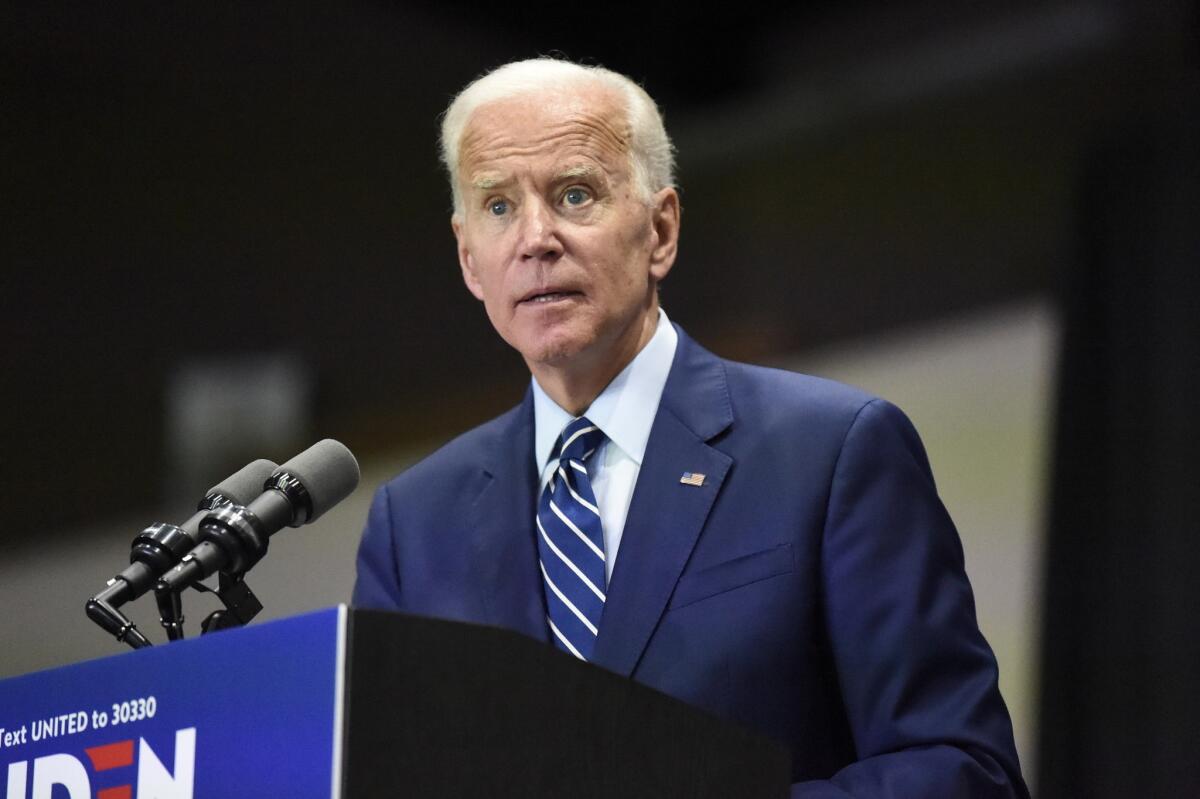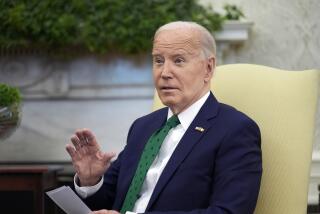Joe Biden apologizes for comments about segregationists, after weeks of criticism

Mounting a fresh effort to defuse attacks on his 40-year record on school busing and other issues, former Vice President Joe Biden on Saturday for the first time made a partial apology and invoked his ties to Barack Obama, to defend himself in a fight that could sway African American voters.
After weeks of criticism for his statements that seemed nostalgic for an era when he worked with segregationists in the Senate of the 1970s, Biden addressed the issue at a campaign event in Sumter, S.C.
“Was I wrong a few weeks ago to somehow give the impression to people that I was praising those men who I successfully opposed time and again? Yes, I was. I regret it,” he said. “And I’m sorry for any of the pain or misconception they may have caused anybody.”
But he did not disavow his past opposition for federally mandated school busing for desegregation, pushed back against what he said were misrepresentations of his record, and accused opponents of both parties of trying to “weaponize my record and use it against me.”
He offered up a blanket defense of his record by saying his background and record had been thoroughly vetted by Obama before being chosen as his running mate in 2008.
“I will take his judgment about my record, my character, my ability to handle the job over anyone else’s,” he said.
Biden made clear that he wants to reorient the campaign to be about the future and his record in the Obama administration, and he bridled at what he considered unfair scrutiny of his decades-old record stripped of context.
“When I talk about the Obama years, my opponents talk about it like it was ancient history,” Biden said. “When others talk about something in the 1970s they talk about it like it was yesterday. Strange, isn’t it?”
The speech — in an early voting state where the black vote is crucial — represents his most aggressive effort yet to get his campaign back on track amid signs that his status as front-runner is slipping in many polls. He turned in a lackluster performance at the first Democratic debate, and he has been buffeted by a long series of controversies over his record in the Senate, which critics have used to portray him as out of step with the contemporary Democratic party.
Democratic debate: Joe Biden pushed on the defensive by Kamala Harris and others »
For decades Biden supported the Hyde amendment, which bans the use of federal funds for abortion; he has recently dropped that support. He has been criticized for his hand in crafting the 1994 anticrime bill, whose strict sentencing requirements have been blamed by critics for contributing to mass incarceration of men of color. He has conceded that some elements of the bill did not work as planned, but defended parts like its provisions protecting women against domestic violence.
His speech Saturday roamed over a range of other points of attack from the left. Faced with criticism of his support for the Iraq war, he emphasized the role Obama gave him in managing the U.S. troop withdrawal. He also defended his support for a bankruptcy bill opposed by progressives, saying his role was to make a bad bill better.
But no issue has proved more nettlesome or emotional for Biden and the rest of the party recently than the criticism lodged against him for opposing federally mandated school busing for desegregation in the 1970s. It was the focus of a sharp line of attack during the debate from Sen. Kamala Harris of California, who spoke of her own experience being bused to a white neighborhood school in Berkeley.
It has put Harris and other Democrats in the awkward position of having to clarify their own views on the sensitive issue. And it stirred political tensions within a crucial constituency that Biden’s rivals are trying to draw from him — African American voters.
Biden’s apology for the comments he made at a fundraiser about working with segregationist senators stood in sharp contrast to his defiant response after he was criticized for it by New Jersey Sen. Cory Booker, another black 2020 rival. It was an unusual break for a politician who rarely apologizes. Under fire early this year for a hands-on campaign style that offended some women, he did not apologize but said he would try to adjust to what he called changing “social norms.”
Asked initially whether he would apologize over his remark that the segregationists called him “son,” but not “boy,” Biden said: “Apologize for what? Cory should apologize. He knows better.”
Biden’s apology Saturday did not directly extend to his position on busing, but he shifted focus to his proposals to address root causes of segregation like housing discrimination and educational inequities.
He also noted, “America in 2019 is a very very different place than the 1970s, and that’s a good thing. I’ve witnessed an incredible amount of change in this nation and I’ve worked to make that change happen. And yes, I’ve changed also.”
More to Read
Get the L.A. Times Politics newsletter
Deeply reported insights into legislation, politics and policy from Sacramento, Washington and beyond. In your inbox three times per week.
You may occasionally receive promotional content from the Los Angeles Times.







